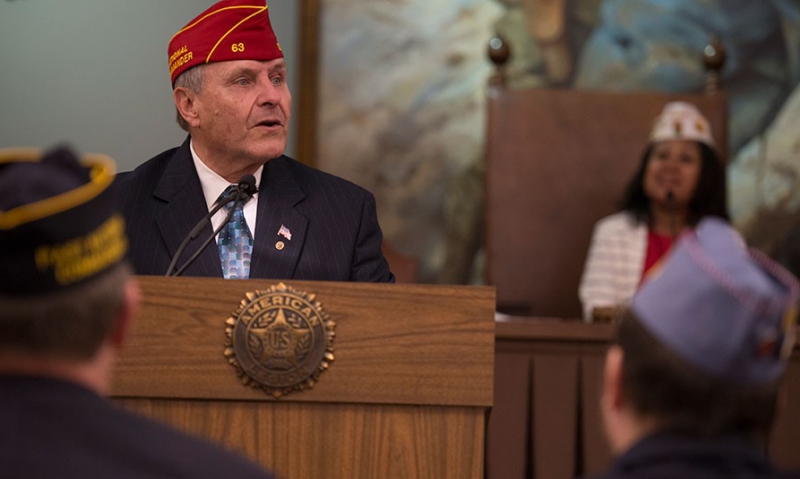
National Commander Charles E. Schmidt personally received the donations from Legion College attendees, which will support his fundraising project.
It’s the responsibility of every American Legion College graduate to share and apply what they learned during the week-long course with Legionnaires in their respective departments. National Commander Charles E. Schmidt reiterated this obligation to the students during their mock department convention Thursday morning at National Headquarters in Indianapolis.
“Many students leave Legion College super motivated. They learn about our great history, programs and services offered and they feel inspired,” he said. “Please be generous with what you learned here. Share that knowledge with your posts, districts and departments.
“It is you who will shape our programs and positions in decades to come.”
Schmidt’s fundraising goal during his tenure as national commander is to raise $1 million for the Legion’s Temporary Financial Assistance Program and $1 million for its service officer training program. The 59 Legion College students helped his efforts by hand-delivering $1,225 in donations.
“That is the one thing about the Legion family is they always come through,” Schmidt said. “Because before we became Legionnaires, somebody was looking out for us, regardless of what it was. And that’s what we do – we take care of those who have borne the battle, and also the veterans and their families."
During the mock department convention, the five districts shared their post conflict scenarios and leadership plan to resolve them.
One scenario involved a longtime honorary-life Legion member who was asked to leave a visiting post because his membership card was expired; his home post had not yet made payment. The veteran issued a letter of complaint that made its way to National Headquarters. The Legion College students as a whole agreed that it was important to keep make amends through an apology to keep ensure the veteran continued his longtime dedication as a Legionnaire.
Another post scenario involved one with a 60 percent membership decline after the installment of a commander who was no well received. The district assigned to the scenario advised holding a new election and providing long-term mentorship.
“We are always reactionary in the Legion – we look at the issue, we take care of the issue and we think it’s done,” said David Elmore, Legion College dean and assistant director of the Legion’s Internal Affairs Division. “This district asked how as mentors do we go forward to help that post prosper. That mentorship has to be there.”
From his district’s scenario, which involved the closing of a post without knowledgement of its members, Legion College student Kenneth George from the Department of California learned that it’s important to not go into a post and “dictate it; this is their post.” Instead, remind the post members that “this is your post; we just want to help you be successful,” George said. “We have to drive them (post members), to drive it (the post).”
- American Legion College

